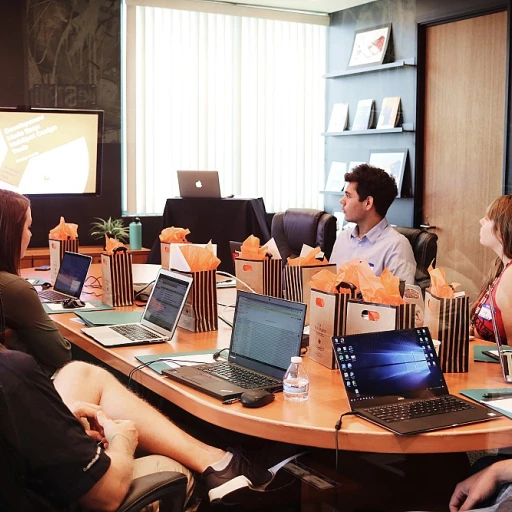
Understanding the Needs of Remote Employees
Identifying the Crucial Elements for Remote Employees
Adjusting to remote work has become a pivotal task for companies in the Arabian Emirates, particularly when optimizing a PC setup. Recognizing the unique requirements of remote employees is essential for enhancing productivity and maintaining seamless business operations. For starters, it is important to understand the varying needs of employees depending on their roles within the company. Different roles may require specific software tools for effective management of tasks. An individualized approach can significantly aid in boosting employee productivity. Moreover, ensuring that remote workers have access to suitable devices is critical. This means providing employees with reliable equipment, such as high-performance laptops and dependable peripherals, to promote a conducive work environment. Investing in these can lead to improved efficiency in tackling daily responsibilities. Time management and productivity also benefit from specialized tools. Companies should consider implementing project management software that aids employees in organizing tasks. Meanwhile, real-time access and collaborative tools can bridge the gap between remote team members, facilitating better communication. Security stands out as another pivotal factor. Companies need to guarantee that sensitive data is protected, necessitating robust remote access protocols and security measures. Monitoring software, employee monitoring tools, and remote desktop solutions can aid in securing the work environment. It is also worth noting that monitoring employees working remotely is not just about overseeing tasks but also providing accurate support. Offering technical solutions and resources can help remote employees troubleshoot issues efficiently, leading to less downtime and improved productivity. For more insights into creating a tailored strategy for optimally managing remote employees, businesses can explore various procurement strategies. Optimizing procurement initiatives specifically designed for IT firms can be a helpful resource for companies aiming to enhance their remote work policies in the Arabian Emirates.Essential Hardware for Remote Work
Essential Hardware for Effective Home Offices
Setting up a functional home office for remote employees in the Arabian Emirates involves more than just providing basic furniture. It's crucial to equip your team with the necessary hardware to ensure they maintain productivity and contribute positively to your business goals from their location. Modern laptops or desktop computers are a primary requirement for remote work. Companies need to prioritize investing in high-quality devices that can handle the latest software and ensure smooth operation. The demands of remote work environments often require this equipment to support a range of tools and applications vital for team communication and project management. Equally important is a reliable and fast internet connection, which forms the backbone of remote operations. Fast and stable internet access enables employees to efficiently use remote desktop solutions and video conferencing tools, allowing seamless communication and collaboration across the workforce. It's advisable for companies to compensate employees for a portion of their home internet cost, ensuring everyone has access to sufficient bandwidth. Moreover, providing accessories like ergonomic chairs and desks, noise-cancelling headphones, and high-resolution monitors can significantly enhance comfort and reduce distractions, thereby increasing productivity levels. An investment in these essential pieces not only demonstrates that a company values its remote employees but also positively impacts employee well-being and work output. Additionally, instilling a remote monitoring system can be advantageous. Such systems can include employee monitoring software that tracks active screen time and productivity, ensuring that company resources are used effectively. However, transparency with such tools is key to maintaining trust and morale within your team's dynamic. In terms of security, companies should supply employees with the means to protect sensitive data actively. Implementing hardware with robust security features and using VPNs for secure remote access are effective countermeasures against cyber threats. It is vital to provide robust support systems for technical issues, allowing employees to address problems swiftly without compromising project timelines or data management. By investing wisely in essential hardware for remote work setups, companies in the Arabian Emirates can optimize their remote workforce's performance, leading to sustained growth and achievement of business objectives. For more insights on how to enhance efficiency in your company, visit our post on enhancing efficiency with CRM solutions.Software and Tools for Productivity
Key Software Solutions for a Productive Remote Workflow
The shift towards a remote work environment has revolutionized the way businesses operate in the Arabian Emirates. To capitalize on this shift and maintain productivity, leveraging the right software solutions is essential. These tools not only ensure seamless communication but also enhance overall efficiency among remote employees. Communication and Collaboration: Remote employees must have access to robust communication platforms. Applications like Microsoft Teams and Zoom facilitate real-time communication, ensuring that employees working from diverse locations can easily collaborate. These tools offer features like chat, video conferencing, and document sharing, which help eliminate geographical barriers, fostering an inclusive work environment. Project Management Tools: Efficient project management software, such as Asana or Trello, can significantly enhance employee productivity by allowing managers to assign tasks and monitor their progress in real time. These platforms facilitate remote access to project timelines, task lists, and deadlines, ensuring that everyone is aligned with the company's objectives. Secure and Efficient Remote Access: For employees to work effectively from afar, remote access software, such as Remote Desktop Protocol (RDP) or Virtual Private Network (VPN) services, is pivotal. These solutions grant secure access to necessary business applications and data, preserving both productivity and the security of sensitive company information. Monitoring Software: While respecting privacy, companies in the Arabian Emirates can utilize monitoring software to understand productivity levels. These tools can track time spent on various tasks, helping management optimize workflows and offer necessary support to remote workers when required. By equipping remote employees with these essential tools, companies can streamline operations and sustain high productivity levels across their virtual teams. To further enhance productivity and management strategies, companies can learn more by visiting Magic Office's advisory blog. This integration of technology ensures that as the work environments continue to evolve, businesses remain competitive and efficient."Security Measures for Remote Work
Implementing Robust Security Protocols
In the realm of remote work, ensuring the security of company data and systems is paramount. With employees accessing sensitive information from various locations, the risk of data breaches and unauthorized access increases. Companies in the Arabian Emirates must prioritize implementing robust security protocols to safeguard their business operations.
Utilizing Secure Connections and VPNs
One of the fundamental steps in securing remote work environments is the use of Virtual Private Networks (VPNs). VPNs encrypt internet connections, providing a secure tunnel for data transmission. This ensures that employees working remotely can access company resources without exposing sensitive information to potential cyber threats.
Ensuring Device Security
Remote employees often use a mix of personal and company-issued devices, such as laptops and smartphones. It is crucial to enforce strict security measures on all devices accessing company networks. This includes installing reliable antivirus software, enabling firewalls, and regularly updating software to patch vulnerabilities.
Implementing Access Controls
Access management is a critical aspect of maintaining security in a remote work setting. Companies should implement strict access controls to ensure that employees only have access to the information necessary for their roles. This minimizes the risk of data leaks and unauthorized access.
Monitoring and Real-Time Alerts
Employing monitoring software can help companies keep track of remote employees' activities. This not only aids in maintaining productivity but also helps in identifying potential security threats in real time. By monitoring remote access and receiving alerts for suspicious activities, businesses can respond swiftly to any security incidents.
Educating Employees on Security Best Practices
Finally, educating employees on security best practices is essential. Regular training sessions can help remote workers understand the importance of security measures and how to implement them effectively. This includes recognizing phishing attempts, using strong passwords, and securing personal devices.
Technical Support and Maintenance
Ensuring Smooth Operations with Robust Technical Support
The key to maintaining optimal productivity in a remote work environment is having a reliable technical support and maintenance system in place. Arabian Emirates companies need to focus on providing their remote employees with the necessary resources to resolve any technical issues that might arise during their day-to-day operations. Providing real-time support is crucial for minimizing downtime and ensuring that employees work efficiently, even from afar. Implementing a dedicated remote desktop support system allows IT teams to quickly access and troubleshoot employees' laptops and other devices. Continuously monitoring remote access ensures that any disruptions are addressed promptly, safeguarding the overall productivity of the remote workforce. Incorporating remote monitoring and employee monitoring tools can further enhance the management process by providing insights into the devices and software being used by remote employees. These tools assist in identifying issues before they impact work, enabling technical teams to offer preemptive solutions. Moreover, regular maintenance schedules should be established to ensure that hardware and software are always in optimal condition. Time tracking and project management software should also be regularly updated to ensure efficacy in monitoring employees' performance and productivity. Overall, a proactive approach to technical support and maintenance can significantly contribute to an effective and sustainable remote work environment in the Arabian Emirates, supporting both business objectives and employee satisfaction.Adapting to Changing Work Environments
Embracing Flexibility and Continuous Learning
In adapting to changing work environments, it's crucial for companies in the Arabian Emirates to foster flexibility and encourage continuous learning among remote employees. As the remote work landscape evolves, so should the strategies and tools utilized by businesses to maintain productivity and efficiency. By embracing adaptable solutions, employees can better manage their workload and companies can maintain a competitive edge.
As remote work setups continue to transform, leveraging effective project management tools and software becomes a pivotal part of managing tasks and deadlines. Businesses should ensure employees have 24/7 access to reliable software platforms that facilitate seamless collaboration and communication. Implementing real-time data sharing and remote access fosters a more connected and responsive work environment.
Companies should also support their remote workforce by investing in employee training focused on the latest productivity and communication tools. Regular workshops or webinars can keep staff well-versed in updated software and tools, enhancing their skill sets and adapting to the demands of remote work.
Security remains a significant concern. With ever-evolving cyber threats, reinforcing data protection protocols is imperative. Employees can be trained on best practices for using secure networks and recognizing security breaches, ultimately upholding the company's integrity.
Ensuring continuous technical support and offering quick resolution of issues can contribute to a smoother remote work experience. Technical staff should regularly monitor remote devices and be proactive in equipment maintenance, minimizing potential disruptions to employees working remotely.
Finally, it's essential for businesses to consistently evaluate their remote work strategies. Utilizing remote monitoring software to monitor employees' work patterns, productivity levels, and project progress can identify areas for improvement. This proactive approach allows companies to adjust strategies as needed, ensuring sustainable success in a continually shifting work environment.













